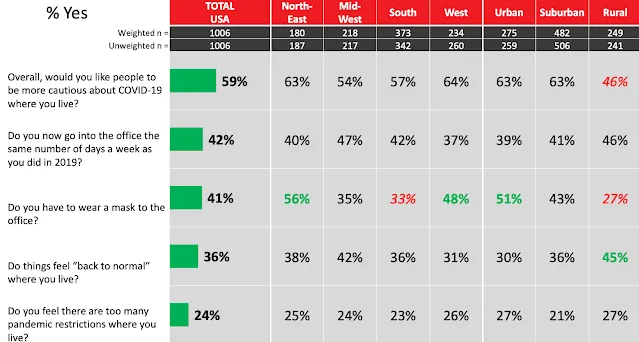Though the coronavirus remains entrenched in rural areas, rural Americans are more likely than their suburban or urban peers to have rejected or given up on social distancing, masking and/or vaccinations. "They feel, in short, that the pandemic is 'over,'" Olga Khazan reports for The Atlantic. According to a recent Atlantic/Leger poll, "people in rural areas are most likely to feel like things are 'back to normal' where they live – 45 percent thought so, compared with 30 percent of urbanites and 36 percent of suburbanites. Rural Americans were also the least likely group to say they wished their neighbors would be more cautious about Covid-19."
Rural Americans were less likely than suburban or urban residents to say most adults they know are vaccinated against the coronavirus, and more likely to say they socialize indoors with unmasked friends, Khazan reports. State and community laws were more likely to foster rural Americans' attitudes: Only 27% of rural residents said they have to wear a mask to work, and rural schools and daycares were less likely to require kids to wear masks or require kids to stay home if they have Covid-19 symptoms.
"For a lot of people who aren’t wearing masks or getting vaccinated, they think that this has just been blown out of proportion, and that people are just too fearful and need to go about their lives," Marcus Plescia, chief medical officer at the Association of State and Territorial Health Officials, told Khazan.
"Among the rural unvaccinated, this is a false sense of security. Covid is spreading rapidly in rural areas, which is worrisome because rural people tend to be older, poorer, and in worse health to begin with," Khazan reports. "If they do get sick, they have less access to hospitals—more than 100 rural hospitalshave closed since 2013. The Covid-19 death rate in rural America is now twice the death rate in urban areas. And the longer that pockets of unvaccinated Americans remain, the greater the likelihood that new variants will take hold and spread elsewhere."
But, Khazan notes, policy makers may not have tried hard enough to understand rural Americans' viewpoints on the pandemic. And it's difficult for many rural counties to get accurate information, especially since many lack health departments and good local newspapers, she writes: "Of course they feel abandoned, and at this point, defiant."
--30--
Cross-posted from the Kentucky Health News







